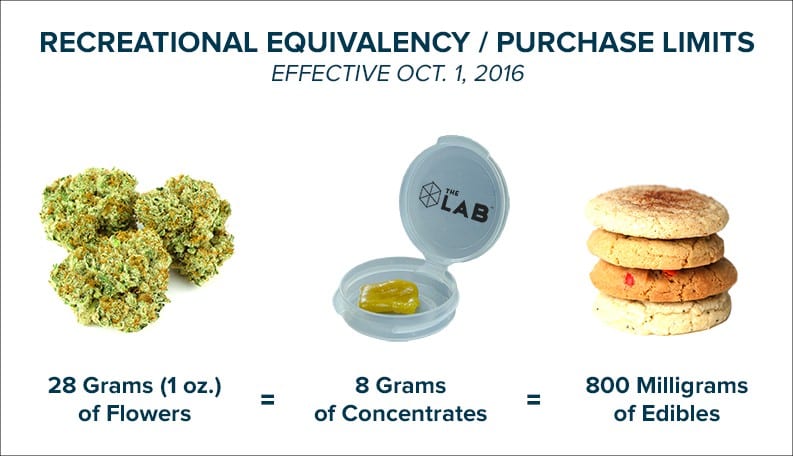In 2009, the voters in Colorado voted in favor of bringing medical cannabis to the Centennial State. Four short years later, recreational cannabis, properly referred to as adult-use cannabis was also voted into law. With both programs living side by side, many people have wondered what is the difference between medical and adult-use cannabis?
Medical
The medical cannabis program in Colorado allows citizens age 18 and up to apply for a medical marijuana card. There is a long list of ailments that qualify an individual for a cannabis prescription. If your doctor deems you suitable for medical cannabis you will be prescribed an allotment of 6 plants. Patients are able to grow their plants themselves, or they can elect to sign over their plant count to a dispensary to grow on their behalf. A medical dispensary’s plant count is based on the number of patients that have assigned them their plants. The more patients a dispensary has, the more plants they are allowed to grow. When a patient assigns their plants to a dispensary, they become a member of the dispensary and receive benefits in the form of discounts on products. This mutually beneficial relationship allows dispensaries to thrive and patients to have a wider selection of products to choose from.
Regardless of where a patient assigns their plants, they can shop at any medical dispensary throughout the state. Patients are able to purchase up to 2 ounces (56 grams) of flower daily or the equivalency in edibles or concentrates. The Colorado medical program equates one gram of concentrate to one gram of flower, so a patient could purchase up to 2 ounces of concentrate at one time. Edibles are a bit different. 1000 milligrams of edibles is equivalent to one gram of flower, so a medical patient could purchase up to 56,000 milligrams of edibles at one time.
Many medical patients require large amounts of cannabis to function throughout their day. Because of this, prices on the medical side tend to be lower so patients can afford to consume the amount of cannabis they need to find relief. In addition, medical cannabis is taxed at the standard Colorado State sales tax rate of 8%. Taxation on the recreational side is much higher and differs from city to city. Currently, insurance does not recognize cannabis as a medicine and therefore will not cover these expenses. We hope in time this changes once cannabis becomes legal on a federal level.
As of 2018, all medical cannabis in the state of Colorado is required to be tested for potency, microbial contamination, and pesticides.
Adult Use
Adult use cannabis is available to anyone that is 21 years of age or older with a valid government-issued I.D. Adults are allowed to purchase and possess up to an ounce (28 grams) of flower, or the equivalency in concentrates or edibles while in the state of Colorado. When shopping at a dispensary, there are a few things to keep in mind. As we mentioned in Exploring Cannabis Products there is a wide variety of products for you to choose from. All of these products are going to follow certain equivalencies that will make up the ounce that you are allowed to purchase.

Edibles in the state of Colorado are limited to 100 milligrams per package and 10 milligrams per individual dose. These regulations came about because the mass population was unfamiliar with cannabis dosing and oftentimes ended up eating too many edibles. In the first couple of years of legalization, we saw an increase in the number of people going to the emergency room believing they were overdosing on cannabis. Since these regulations have been put in place, we have seen fewer people reporting negative experiences with edibles.
The adult-use market is much larger than the medical market today. This is because medical cannabis companies made their entire product line available on the recreational side and thus many medical patients are forgoing renewing their medical cards. It must be stated that adult-use cannabis is taxed at a much higher rate than medical cannabis. In Denver, recreational cannabis is taxed at 26%, but this rate varies from county to county.
All recreational cannabis in the state of Colorado is required to be tested for potency, microbial contamination, and pesticides.
The reality is medical and adult use cannabis strains and product lines are identical. The only difference between the two is how much you can purchase and the rate in which they are taxed. Medical and adult use cannabis plants literally grow side by side and are given the same quality of care. When it comes down to it, these two separate markets are really two sides of the same coin.
Continue your education on how medical and adult use cannabis differ in our next blog, The Blurred Lines Between Medical and Recreational Cannabis
For a deeper dive into the cannabis plant, its various compounds and the industry that surrounds it, call and book your private educational experience with City Sessions today. 720-250-8828
